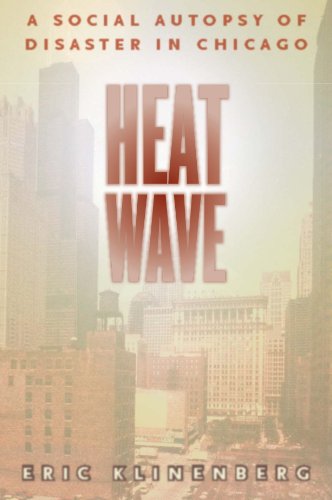Verwandte Artikel zu Heat Wave: A Social Autopsy of Disaster in Chicago

Inhaltsangabe
In July 1995, Chicagoans suffered through a blistering week-long heat wave that buckled streets and downed portions of the city's power grid. It also left over 700 people dead. In this alarming book, Eric Klinenberg tells us how such fatalities could have happened in a modern American city. The picture he paints - of social breakdown, unresponsive government and poorly equipped public services - is one no reader interested in the current state of American urbanism can afford to ignore.
Die Inhaltsangabe kann sich auf eine andere Ausgabe dieses Titels beziehen.
Über die Autorin bzw. den Autor
Aus dem Klappentext
Heat waves in the United States kill more people during a typical year than all other natural disasters combined. Until now, no one could explain either the overwhelming number or the heartbreaking manner of the deaths resulting from the 1995 Chicago heat wave. Meteorologists and medical scientists have been unable to account for the scale of the trauma, and political officials have puzzled over the sources of the city's vulnerability. InHeat Wave, Eric Klinenberg takes us inside the anatomy of the metropolis to conduct what he calls a "social autopsy," examining the social, political, and institutional organs of the city that made this urban disaster so much worse than it ought to have been.
Starting with the question of why so many people died at home alone, Klinenberg investigates why some neighborhoods experienced greater mortality than others, how the city government responded to the crisis, and how journalists, scientists, and public officials reported on and explained these events. Through a combination of years of fieldwork, extensive interviews, and archival research, Klinenberg uncovers how a number of surprising and unsettling forms of social breakdown-including the literal and social isolation of seniors, the institutional abandonment of poor neighborhoods, and the retrenchment of public assistance programs-contributed to the high fatality rates. The human catastrophe, he argues, cannot simply be blamed on the failures of any particular individuals or organizations. For when hundreds of people die behind locked doors and sealed windows, out of contact with friends, family, community groups, and public agencies, everyone is implicated in their demise.
As Klinenberg demonstrates in this incisive and gripping account of the contemporary urban condition, the widening cracks in the social foundations of American cities that the 1995 Chicago heat wave made visible have by no means subsided as the temperatures returned to normal. The forces that affected Chicago so disastrously remain in play in America's cities, and we ignore them at our peril.
„Über diesen Titel“ kann sich auf eine andere Ausgabe dieses Titels beziehen.
EUR 6,67 für den Versand von USA nach Deutschland
Versandziele, Kosten & DauerNeu kaufen
Diesen Artikel anzeigenEUR 11,49 für den Versand von Vereinigtes Königreich nach Deutschland
Versandziele, Kosten & DauerSuchergebnisse für Heat Wave: A Social Autopsy of Disaster in Chicago
Heat Wave: A Social Autopsy of Disaster in Chicago
Anbieter: ThriftBooks-Reno, Reno, NV, USA
Paperback. Zustand: Good. No Jacket. Pages can have notes/highlighting. Spine may show signs of wear. ~ ThriftBooks: Read More, Spend Less. Artikel-Nr. G0226443221I3N00
Anzahl: 1 verfügbar
Heat Wave: A Social Autopsy of Disaster in Chicago
Anbieter: ThriftBooks-Phoenix, Phoenix, AZ, USA
Paperback. Zustand: Good. No Jacket. Pages can have notes/highlighting. Spine may show signs of wear. ~ ThriftBooks: Read More, Spend Less. Artikel-Nr. G0226443221I3N00
Anzahl: 1 verfügbar
Heat Wave: A Social Autopsy of Disaster in Chicago
Anbieter: ThriftBooks-Reno, Reno, NV, USA
Paperback. Zustand: Good. No Jacket. Former library book; Pages can have notes/highlighting. Spine may show signs of wear. ~ ThriftBooks: Read More, Spend Less. Artikel-Nr. G0226443221I3N10
Anzahl: 1 verfügbar
Heat Wave: A Social Autopsy of Disaster in Chicago
Anbieter: ThriftBooks-Dallas, Dallas, TX, USA
Paperback. Zustand: Fair. No Jacket. Readable copy. Pages may have considerable notes/highlighting. ~ ThriftBooks: Read More, Spend Less. Artikel-Nr. G0226443221I5N00
Anzahl: 1 verfügbar
Heat Wave: A Social Autopsy of Disaster in Chicago
Anbieter: ThriftBooks-Atlanta, AUSTELL, GA, USA
Paperback. Zustand: Good. No Jacket. Former library book; Pages can have notes/highlighting. Spine may show signs of wear. ~ ThriftBooks: Read More, Spend Less. Artikel-Nr. G0226443221I3N10
Anzahl: 1 verfügbar
Heat Wave: A Social Autopsy of Disaster in Chicago
Anbieter: ThriftBooks-Dallas, Dallas, TX, USA
Paperback. Zustand: Good. No Jacket. Former library book; Pages can have notes/highlighting. Spine may show signs of wear. ~ ThriftBooks: Read More, Spend Less. Artikel-Nr. G0226443221I3N10
Anzahl: 1 verfügbar
Heat Wave: A Social Autopsy of Disaster in Chicago
Anbieter: ThriftBooks-Dallas, Dallas, TX, USA
Paperback. Zustand: Good. No Jacket. Pages can have notes/highlighting. Spine may show signs of wear. ~ ThriftBooks: Read More, Spend Less. Artikel-Nr. G0226443221I3N00
Anzahl: 1 verfügbar
Heat Wave: A Social Autopsy of Disaster in Chicago
Anbieter: ThriftBooks-Atlanta, AUSTELL, GA, USA
Paperback. Zustand: Good. No Jacket. Pages can have notes/highlighting. Spine may show signs of wear. ~ ThriftBooks: Read More, Spend Less. Artikel-Nr. G0226443221I3N00
Anzahl: 1 verfügbar
Heat Wave : A Social Autopsy of Disaster in Chicago
Anbieter: Better World Books, Mishawaka, IN, USA
Zustand: Good. Used book that is in clean, average condition without any missing pages. Artikel-Nr. 4485439-6
Anzahl: 2 verfügbar
Heat Wave : A Social Autopsy of Disaster in Chicago
Anbieter: Better World Books: West, Reno, NV, USA
Zustand: As New. Used book that is in almost brand-new condition. Artikel-Nr. 14837661-6
Anzahl: 1 verfügbar

